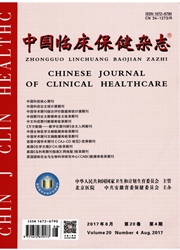

 中文摘要:
中文摘要:
目的 探讨骨化三醇对冠心病患者血管内皮功能及踝臂指数(ABI)的影响。方法 选择100例确诊为冠心病患者按随机数字表分为骨化三醇治疗组(n=50)及常规治疗组(n=50)。常规治疗组给予规范的冠心病药物治疗及安慰剂治疗,骨化三醇治疗组给予规范的冠心病药物治疗+骨化三醇治疗。骨化三醇每日0.25μg。两组患者治疗后,根据病情加用其他药物。随访期1年,所有研究对象在研究初始及随访结束时两次行血清Ca2+、肱动脉对反应性充血的内皮依赖血管扩张反应(FMD)及ABI水平检测,并记录两研究组患者心血管事件发生率及不良反应的发生率。结果 两组患者接受治疗前FMD、ABI、血清Ca2+水平均差异无统计学意义。研究结束时,骨化三醇治疗组FMD、ABI分别是(11.02±2.08)、(0.86±0.10),与常规治疗组[FMD=(9.68±3.87)、ABI=(0.80±0.07)]比较均显著升高,P〈0.05;两组间血清Ca2+水平差异无统计学意义,P〉0.05;骨化三醇治疗组心血管事件发生率6.4%,常规治疗组2.1%,两组差异无统计学意义。结论 骨化三醇可改善冠心病患者血管内皮功能及ABI水平。
 英文摘要:
英文摘要:
Objective To investigate the effect of Calcitriol on the function of arterial endothelium and ankle arm index(ABI) in patients with coronary heart disease (CHD). Methods 100 patients with CHD were recruited to this study. Patients were randomly divided into two groups : general therapy group ( n = 50 ) in which patients were treated with standard CHD drugs combined wiht placebo and Calcitriol therapy group (n = 50) in which patients were treated with standard CHD drugs combined wiht calcitriol dosed 0. 25ug daily. Supplement of other drugs might be considered according to patients condition. Both groups were followed up for 1 year. The levels of serum Ca^2+ , endothelium-depend- ent vasodilation of arteria brachialis(FMD) and ABI were examined in both groups. The rates of cardiovascular events and adverse reactions in the two study groups were recorded. Results There was no significant difference between the two groups in the levels of FMD, ABI, serum Ca^2+ before therapy. By the end of this study,the levels of FMD and ABI in calcitriol therapy group's [ FMD = (9.68 ± 3.87), ABI = (0.80± 0.07 ) ] significantly increased compared with general therapy group[ FMD = ( 9.68 ± 3.87 ), ABI = ( 0. 80± 0. 07 ) ] ( P 〈 0.05 ). Two groups' levels of serum Ca^2+ was no significant differences ( P 〉 0.05 ). Caleitriol therapy group's incidence of cardiovascular events was 6.4% , general ther- apy group was 2.1% ,there was no significant differences between the two groups. Conclusions Caleitriol can improve the arterial endothelium and ABI in patients with CHD.
 同期刊论文项目
同期刊论文项目
 同项目期刊论文
同项目期刊论文
 期刊信息
期刊信息
